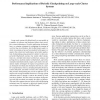Free Online Productivity Tools
i2Speak
i2Symbol
i2OCR
iTex2Img
iWeb2Print
iWeb2Shot
i2Type
iPdf2Split
iPdf2Merge
i2Bopomofo
i2Arabic
i2Style
i2Image
i2PDF
iLatex2Rtf
Sci2ools
117
click to vote
IPPS
2005
IEEE
2005
IEEE
Performance Implications of Periodic Checkpointing on Large-Scale Cluster Systems
Large-scale systems like BlueGene/L are susceptible to a number of software and hardware failures that can affect system performance. Periodic application checkpointing is a common technique for mitigating the amount of work lost due to job failures, but its effectiveness under realistic circumstances has not been studied. In this paper, we analyze the system-level performance of periodic application checkpointing using parameters similar to those projected for BlueGene/L systems. Our results reflect simulations on a toroidal interconnect architecture, using a real job log from a machine similar to BlueGene/L, and with a real failure distribution from a large-scale cluster. Our simulation studies investigate the impact of parameters such as checkpoint overhead and checkpoint interval on a number of performance metrics, including bounded slowdown, system utilization, and total work lost. The results suggest that periodic checkpointing may not be an effective way to improve the average...
Distributed And Parallel Computing | Hardware Failures | IPPS 2005 | Job Failures | Periodic Application Checkpointing |
Related Content
| Added | 25 Jun 2010 |
| Updated | 25 Jun 2010 |
| Type | Conference |
| Year | 2005 |
| Where | IPPS |
| Authors | Adam J. Oliner, Ramendra K. Sahoo, José E. Moreira, Meeta Sharma Gupta |
Comments (0)

